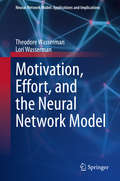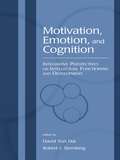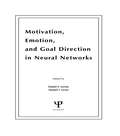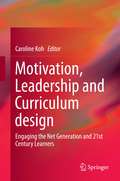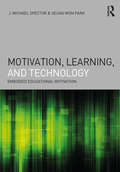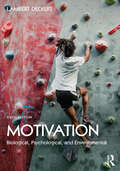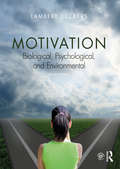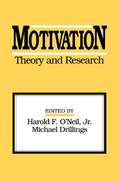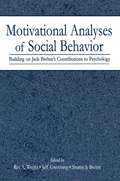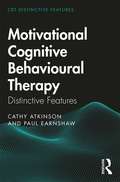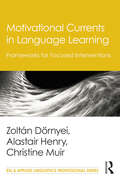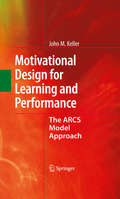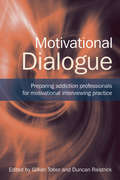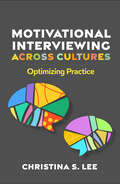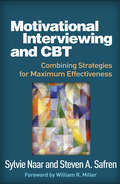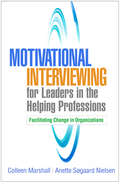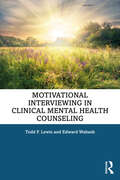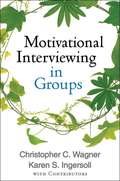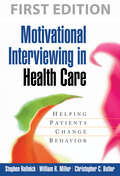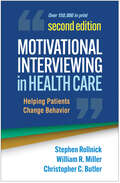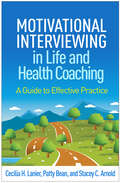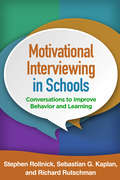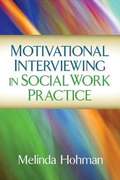- Table View
- List View
Motivation, Effort, and the Neural Network Model (Neural Network Model: Applications and Implications)
by Theodore Wasserman Lori WassermanOur understanding of how the human brain operates and completes its essential tasks continues is fundamentally altered from what it was ten years ago. We have moved from an understanding based on the modularity of key structural components and their specialized functions to an almost diametrically opposed, highly integrated neural network model, based on a vertically organized brain dependent on small world hub principles. This new understanding completely changes how we understand essential psychological constructs such as motivation. Network modeling posits that motivation is a construct that describes a modified aspect of the operation of the human learning system that is specifically designed to cause a person to pursue a goal. Anthropologically and developmentally, these goals were initially basic, including things like food, shelter and reproduction. Over the course of time and development they develop into a complex web of extrinsic and then intrinsic goals, objectives and values. The core for all of this development is the inborn flight or fight reaction has been modified over time by a combination of inborn human temperamental characteristics and life experiences. This process of modification is, in part, based on the operation of a network based error-prediction network working in concert with the reward network to produce a system of ever evolving valuations of goals and objectives. These valuations are never truly fixed. They are constantly evolving, being modified and shaped by experience. The error prediction network and learning related networks work in concert with the limbic system to allow affect laden experiences to inform the process of valuation. These networks, operating in concert, produce a cognitive process we call motivation. Like most networks, the motivation system of networks is recruited when the task demands of the situation require them. Understanding motivation from this perspective has profound implications for many scientific disciplines in general and psychology in specific. Psychologically, this new understanding will alter how we understand client behavior in therapy and when being evaluated. This new understanding will provide direction for new therapeutic intervention for a variety of disorders of mental health. It will also inform testing practices concerning the evaluation of effort and malingering. This book is not a project in reductionism. It is the polar opposite. A neural network understanding of the operation of the human brain allows for the integration of what has come before into a comprehensive and integrated model. It will likely provide the basis for future research for years to come.
Motivation, Emotion, and Cognition: Integrative Perspectives on Intellectual Functioning and Development (Educational Psychology Series)
by Robert J. Sternberg David Yun DaiThe central argument of this book is that cognition is not the whole story in understanding intellectual functioning and development. To account for inter-individual, intra-individual, and developmental variability in actual intellectual performance, it is necessary to treat cognition, emotion, and motivation as inextricably related. Motivation, Emotion, and Cognition: Integrative Perspectives on Intellectual Functioning and Development: *represents a new direction in theory and research on intellectual functioning and development; *portrays human intelligence as fundamentally constrained by biology and adaptive needs but modulated by social and cultural forces; and *encompasses and integrates a broad range of scientific findings and advances, from cognitive and affective neurosciences to cultural psychology, addressing fundamental issues of individual differences, developmental variability, and cross-cultural differences with respect to intellectual functioning and development.By presenting current knowledge regarding integrated understanding of intellectual functioning and development, this volume promotes exchanges among researchers concerned with provoking new ideas for research and provides educators and other practitioners with a framework that will enrich understanding and guide practice.
Motivation, Emotion, and Goal Direction in Neural Networks
by Daniel S. Levine Samuel J. LevenThe articles gathered in this volume represent examples of a unique approach to the study of mental phenomena: a blend of theory and experiment, informed not just by easily measurable laboratory data but also by human introspection. Subjects such as approach and avoidance, desire and fear, and novelty and habit are studied as natural events that may not exactly correspond to, but at least correlate with, some (known or unknown) electrical and chemical events in the brain.
Motivation, Leadership and Curriculum design
by Caroline KohThis book discusses the links between the basis of motivational, leadership and curricular constructs with regards to 21st century and net-generation learning. It brings together recent developments in motivation, educational leadership and curriculum design in order to offer a better understanding of what is already known and what is yet to be explored in these fields. It consists of a collection of findings on recent educational developments, including topics such as motivating the 21st century learner, leadership practices and influences, curriculum design and models, novel learning environments and 21st century learners and their needs.
Motivation, Learning, and Technology: Embodied Educational Motivation (Interdisciplinary Approaches to Educational Technology)
by J. Michael Spector Seung Won ParkMotivation, Learning, and Technology is a fresh, thorough, and practical introduction to motivational research, theories, and applications for learning and instruction. Written for both instructional designers and teachers, this foundational textbook combines learning design and learning technologies, synthesis of current research and models, and practical advice for those looking to improve how they motivate learners. Building from existing models in an interactional, holistic approach, J. Michael Spector and Seung Won Park guide readers through all steps of educational motivation, from designing a motivation plan through implementation and assessment.
Motivation: Biological, Psychological, and Environmental
by Lambert DeckersMotivation provides an accessible introduction to motivation and emotion, combining classic studies with current research and uses numerous real-world examples to engage the student and make, often difficult, theoretical concepts come to life. By understanding and applying the principles of motivation described in the text, students will not only discover insights into what motivates their own behavior but also how to instigate self-change through goal-setting. Throughout the book the author adopts an evolutionary approach to explore the effect of interpersonal relationships, food preferences, fear, music, and the emotions on motivation, at the same time considering how personality traits and psychological needs are essential for understanding why people are motivated by different things. The motivation of compulsive behavior from addictions, such as drugs, gambling, Internet gaming, and obsessive exercise is also considered, providing a truly comprehensive overview of biological, psychological, and environmental sources of motivation. The sixth edition has been thoroughly updated throughout and is accompanied by an instructor’s manual that contains multiple choice questions, essay questions with answers, websites related to motivation and emotion, power point slides, in-class activities, and discussion questions. It is an essential read for all students of motivation.
Motivation: Biological, Psychological, and Environmental (Mysearchlab Series 15% Off Ser.)
by Lambert DeckersThis textbook provides a complete overview of motivation and emotion, using an overarching organizational scheme of how biological, psychological, and environmental sources become motivation—the inducement of behavior, feelings, and cognition. It combines classic studies with current research and uses numerous real-world examples to engage the student and make often-difficult theoretical concepts come to life. By understanding and applying the principles of motivation described in the text, students will not only discover insights into what motivates their own behavior but also how to instigate self-change. Thoroughly revised and updated throughout, this fifth edition provides a major review of recent research, with over 225 new references, including expansion in the areas of goal motivation and emotion psychology. Other updated topics include new findings and interpretations on how evolution affects our preferences, how personality traits determine motivation, and how self-control depends on a cost/benefit analysis. The addition of individual chapter glossaries and an increased number of links to additional resources supplement student learning. This textbook is suitable as a primary text for courses on motivation. For additional resources, please consult the companion website at www.routledge.com/cw/deckers.
Motivation: Theory And Research
by Harold F. O’Neil Jr. Michael DrillingsDesigned for professionals and graduate students in the personality/social, military, and educational psychology, and assessment/evaluation communities, this volume explores the state of the art in motivational research for individuals and teams from multiple theoretical viewpoints as well as their effects in both schools and training environments. The great majority of education and training R&D is focused on the cognitive dimensions of learning, for instance, the acquisition and retention of knowledge and skills. Less attention has been given in the literature and in the design of education and training itself to motivational variables and their influence on performance. As such, this book is unique in the following montage of factors: * a focus on motivation of teams or groups as well as individuals; * an examination of the impact of motivation on performance (and, thus, also on cognition) rather than only on motivation itself; * research in training as well as educational settings. The data reported were collected in various venues including schools, laboratories and field settings. The chapter authors are the researchers that, in many cases, have defined the state of the art in motivation.
Motivational Analyses of Social Behavior: Building on Jack Brehm's Contributions to Psychology
by Jeff Greenberg Rex A. Wright Sharon S. BrehmThis book honors Jack W. Brehm's contributions to psychology, all of which revolve around a central theme of motivation and social behavior. It begins with two personal chapters and then presents a collection of cutting-edge, substantive chapters authored by researchers whose work Brehm has strongly influenced. It concludes with a chapter by Jack Brehm that reflects on the field of psychology, discusses a new theory of social influence, and offers ideas about the direction in which our understanding of human behavior could move. Motivational Analyses of Social Behavior will be of value to research scientists, educators, and practitioners interested in social motivational processes and those who developed major theories in this area. Interested readers include individuals specializing in social, clinical, organizational, personality, health, and motivational psychology, and psychophysiology. The book would also be ideal for advanced courses on social motivation and the history of psychology.
Motivational Cognitive Behavioural Therapy: Distinctive Features (CBT Distinctive Features)
by Cathy Atkinson Paul EarnshawThis informative and straightforward book explores the emergence of motivational interviewing (MI) and cognitive behavioural therapy (CBT), with specific attention given to the increasing focus on the central importance of the therapeutic alliance in improving client outcomes. Comprising 30 short chapters divided into two parts – theory and practice – this entry in the popular "CBT Distinctive Features Series" covers the key features of MI-informed CBT, offering essential guidance for students and practitioners experienced in both MI and CBT, as well as practitioners from other theoretical orientations who require an accessible guide to this developing approach.
Motivational Currents in Language Learning: Frameworks for Focused Interventions (ESL & Applied Linguistics Professional Series)
by Zoltán Dörnyei Alastair Henry Christine MuirBuilding on Zoltán Dörnyei’s authoritative work in the field of learner motivation, this book introduces a new conceptualization—Directed Motivational Currents (DMCs)—and sets out the defining aspects of what they are, what they are not, and how they are related to language learning motivation. Going beyond focused behavior in a single activity, DMCs concern intensive long-term motivation. The distinctive feature of the theory is that it views motivation not simply as a springboard for action but also as a uniquely self-renewing and sustainable process. It is this energizing capacity which distinguishes DMCs from almost every other motivational construct described in the research literature. Motivational Currents in Language Learning offers new insights, valuable both to motivation researchers and classroom practitioners. The accessible style, along with plentiful illustrations and practical suggestions for promoting sustained learning, invite readers to think about motivation in a different way. Highly relevant for language teachers, teachers-in-training, teacher educators, and researchers in TESOL and applied linguistics, the book explains how the DMC construct can be integrated into course structures and teaching methodologies, and encourages teachers to try out novel methods for harnessing motivational power in classroom settings.
Motivational Design for Learning and Performance
by John M. KellerIt is impossible to control another person's motivation. But much of the instructor's job involves stimulating learner motivation, and learning environments should ideally be designed toward this goal. Motivational Design for Learning and Performance introduces readers to the core concepts of motivation and motivational design and applies this knowledge to the design process in a systematic step-by-step format. The ARCS model--theoretically robust, rooted in best practices, and adaptable to a variety of practical uses--forms the basis of this problem-solving approach. Separate chapters cover each component of the model--attention, relevance, confidence, and satisfaction--and offer strategies for promoting each one in learners. From there, the motivational design process is explained in detail, supplemented by real-world examples and ready-to-use worksheets. The methods are applied to traditional and alternative settings, including gifted classes, elementary grades, self-directed learning, and corporate training. And the book is geared toward the non-specialist reader, making it accessible to those without a psychology or teaching background. With this guide, the reader learns how to: Identify motivation problems and goals Decide whether the environment or the learners need changing Generate attention, relevance, confidence, and satisfaction in learners Integrate motivational design and instructional design Select, develop, and evaluate motivational materials Plus a wealth of tables, worksheets, measures, and other valuable tools aid in the design process Comprehensive and enlightening, Motivational Design for Learning and Performance furnishes an eminently practical body of knowledge to researchers and professionals in performance technology and instructional design as well as educational psychologists, teachers and trainers.
Motivational Dialogue: Preparing Addiction Professionals for Motivational Interviewing Practice
by Gillian Tober Duncan RaistrickMotivational Dialogue explores the application of motivational interviewing in various contexts, with a view to enhancing understanding and improving practice. The book describes the research and practice of motivational interviewing as a stand alone intervention, as an adjunct to further treatment, and as a style of delivery of social and behavioural interventions. The contributors draw on their expertise and experience as researchers, teachers and practitioners to encourage the reader to appreciate the broad applicability of motivational dialogue. The book is divided into five sections, which cover: reflections and a model the evidence base learning and practice four studies of motivational therapy in practice motivational dialogue and stepped care. Motivational Dialogue will be of great interest to psychiatrists, clinical psychologists and anyone in the social and health care professions who is involved in assisting people to challenge addictive behaviours.
Motivational Interviewing across Cultures: Optimizing Practice (Applications of Motivational Interviewing Series)
by Christina S. LeeThis pragmatic guide describes tested ways to adapt motivational interviewing (MI) to optimize outcomes when practitioner and client come from different cultural backgrounds; in particular, when clients are members of marginalized groups. Using rich examples and sample dialogues, Christina S. Lee shows how affirming a client's cultural identity is part and parcel of MI's humanistic, person-centered mindset. The book provides instruction on key therapeutic tasks, such as strengthening rapport, asking about culture without stereotyping, and inquiring about experiences of stigma and discrimination in a way that increases motivation to change. Links between social and structural determinants of health, sociocultural stressors, mental health disparities, and substance use are highlighted. Special features include "Pause and Consider" sidebars and end-of-chapter key takeaway points. This book is in the Applications of Motivational Interviewing series, edited by Stephen Rollnick, William R. Miller, and Theresa B. Moyers.
Motivational Interviewing and CBT: Combining Strategies for Maximum Effectiveness
by William R. Miller Steven A. Safren Sylvie NaarProviding tools to enhance treatment of any clinical problem, this book shows how integrating motivational interviewing (MI) and cognitive-behavioral therapy (CBT) can lead to better client outcomes than using either approach on its own. The authors demonstrate that MI strategies are ideally suited to boost client motivation and strengthen the therapeutic relationship, whether used as a pretreatment intervention or throughout the course of CBT. User-friendly features include extensive sample dialogues, learning exercises for practitioners, and 35 reproducible client handouts. Purchasers get access to a Web page where they can download and print the reproducible materials in a convenient 8 1/2" x 11" size. This book is in the Applications of Motivational Interviewing series.
Motivational Interviewing for Leaders in the Helping Professions: Facilitating Change in Organizations (Applications of Motivational Interviewing)
by Colleen Marshall Anette Søgaard NielsenWritten expressly for leaders in health care and the social services, this accessible book shows how motivational interviewing (MI) can transform conversations about change within an organization. The authors demonstrate powerful ways to use MI to generate solutions and get employees and organizations unstuck, whether mentoring a staff member in a new role, addressing performance problems, or redesigning procedures or programs. Readers are guided to skillfully and ethically apply the core MI processes--engaging, focusing, evoking, and planning--in the management context. User-friendly features include reproducible worksheets, end-of-chapter self-reflection exercises, and extended case vignettes. Purchasers get access to a companion website where they can download and print these materials in a convenient 8 ½" x 11" size. This book is in the Applications of Motivational Interviewing series, edited by Stephen Rollnick, William R. Miller, and Theresa B. Moyers.
Motivational Interviewing for Working with Children and Families: A Practical Guide for Early Intervention and Child Protection
by David Wilkins Donald Forrester Charlotte WhittakerDrawing on 20 years of practical experience, research and teaching in the field, this book is a comprehensive guide on the use of Motivational Interviewing (MI) in child protection and family social work. MI increases the likelihood of behavioural change, working with client resistance to encourage a constructive environment when initiating difficult conversations. This makes it particularly effective for child and family social care. Drawing on over 500 studies spanning 11 local authorities, this book uses recordings of real meetings between social workers and families to explain what MI is, how it can be used in child and family social work and how to improve MI skills.An invaluable resource for frontline child protection and family social workers, this book will enable to help you to better understand the needs of the people you support and be more effective in providing the right kind of support.
Motivational Interviewing in Clinical Mental Health Counseling
by Todd F. Lewis Edward WaheshMotivational Interviewing in Clinical Mental Health Counseling is a cutting-edge guide to empowering counselors with the philosophical and actionable elements of motivational interviewing. This textbook, appropriate for primary or supplementary use in counseling coursework, is a practitioner and student-friendly text appropriate for readers across all levels of familiarity with motivational interviewing. Chapters integrate and present the newest conceptual and empirical literature, and the relevant, up-to-date content in each chapter is accompanied by a detailed case study and specific training exercises that will enhance counselors’ proficiency in core skills. Motivational Interviewing in Clinical Mental Health Counseling introduces new learners to the skills and philosophy of motivational interviewing, enhances the skills of veterans familiar to the framework, and is the perfect companion for students of motivational interviewing across a variety of mental health counseling courses.
Motivational Interviewing in Groups
by Christopher C. Wagner Karen S. IngersollA unique clinical resource, this book shows how to infuse the methods and spirit of motivational interviewing (MI) into group-based interventions. The authors demonstrate how the four processes of MI with individuals translate into group contexts. They explain both the challenges and the unique benefits of MI groups, guiding practitioners to build the skills they need to lead psychoeducational, psychotherapeutic, and support groups successfully. A wealth of clinical examples are featured. Chapters by contributing authors present innovative group applications targeting specific problems: substance use disorders, dual diagnosis, chronic health conditions, weight management, adolescent risk behaviors, intimate partner violence, and sexual offending.This book is in the Applications of Motivational Interviewing series.
Motivational Interviewing in Health Care
by Stephen Rollnick William MillerMuch of health care today involves helping patients manage conditions whose outcomes can be greatly influenced by lifestyle or behavior change. Written specifically for health care professionals, this concise book presents powerful tools to enhance communication with patients and guide them in making choices to improve their health, from weight loss, exercise, and smoking cessation, to medication adherence and safer sex practices. Engaging dialogues and vignettes bring to life the core skills of motivational interviewing (MI) and show how to incorporate this brief evidence-based approach into any health care setting. Appendices include MI training resources and publications on specific medical conditions.
Motivational Interviewing in Health Care, Second Edition: Helping Patients Change Behavior (Applications of Motivational Interviewing)
by Stephen Rollnick William R. Miller Christopher C. ButlerThe definitive guide to motivational interviewing (MI) for health care practitioners has been completely revised to reflect important developments and make the approach even more accessible. When it comes to helping patients manage chronic and acute conditions and make healthier choices in such areas as medication adherence, smoking, diet, and preventive care, good advice alone is not enough. This indispensable book shows how to use MI techniques to transform conversations about change. Even the briefest clinical interaction can serve to build trust, clarify patients' goals as well as reasons for ambivalence, and guide them to take positive steps. Vivid sample dialogues, tips, and scripts illustrate ways to incorporate this evidence-based approach into diverse health care settings. New to This Edition *Restructured around the current four-process model of MI (engaging, focusing, evoking, and planning). *Incorporates lessons learned from the authors' ongoing clinical practice and practitioner training workshops. *Chapters on advice-giving, brief consultations, merging MI with assessment, MI in groups, and making telehealth consultations more effective. *Additional practical features--extended case examples, "Try This" activities, and boxed reflections from practitioners in a range of contexts. This book is in the Applications of Motivational Interviewing series, edited by Stephen Rollnick, William R. Miller, and Theresa B. Moyers.
Motivational Interviewing in Life and Health Coaching: A Guide to Effective Practice (Applications of Motivational Interviewing Series)
by Cecilia H. Lanier Patty Bean Stacey C. ArnoldWritten by and for coaches, this groundbreaking book shows how motivational interviewing (MI) can be infused into health and wellness coaching and life coaching to help clients clarify and achieve their goals. Cecilia H. Lanier, Patty Bean, and Stacey C. Arnold concisely explain how the MI spirit, method, and skills mesh perfectly with professional coaching standards and core competencies. The book is packed with concrete examples, sample dialogues that illustrate ways to use MI in coaching conversations, and learning questions and activities. The companion website features 20 downloadable handouts plus an overview of research support for coaching with MI.
Motivational Interviewing in Nutrition and Fitness (Applications of Motivational Interviewing)
by Laura Curtis Dawn CliffordMaking and maintaining lasting changes in nutrition and fitness is not easy for anyone. Yet the communication style of a health professional can make a huge difference. This book presents the proven counseling approach known as motivational interviewing (MI) and shows exactly how to use it in day-to-day interactions with clients. MI offers simple yet powerful tools for helping clients work through ambivalence, break free of diets and quick-fix solutions, and overcome barriers to change. Extensive sample dialogues illustrate specific ways to enhance conversations about meal planning and preparation, exercise, body image, disordered eating, and more. Reproducible forms and handouts can be downloaded and printed in a convenient 8 1/2" x 11" size.
Motivational Interviewing in Schools: Conversations to Improve Behavior and Learning
by Stephen Rollnick Richard Rutschman Sebastian G. KaplanThe first teacher's guide to the proven counseling approach known as motivational interviewing (MI), this pragmatic book shows how to use everyday interactions with students as powerful opportunities for change. MI comprises skills and strategies that can make brief conversations about any kind of behavioral, academic, or peer-related challenge more effective. Extensive sample dialogues bring to life the "dos and don'ts" of talking to K-12 students (and their parents) in ways that promote self-directed problem solving and personal growth. The authors include the distinguished codeveloper of MI plus two former classroom teachers. User-friendly features include learning exercises and reflection questions; additional helpful resources are available at the companion website. Written for teachers, the book will be recommended and/or used in teacher workshops by school psychologists, counselors, and social workers.
Motivational Interviewing in Social Work Practice
by Melinda HohmanMotivational interviewing (MI) offers powerful tools for helping social work clients draw on their strengths to make desired changes in their lives. This reader-friendly book introduces practitioners and students to MI and demonstrates how to integrate this evidence-based method into direct practice. Melinda Hohman and her associates describe innovative applications for diverse clients and practice areas, including substance abuse treatment, mental health, child welfare, community organizing, and others. Extensive sample dialogues illustrate MI skills in action with individuals and groups. The book also presents best practices for MI training, teaching, and agency-wide integration.
